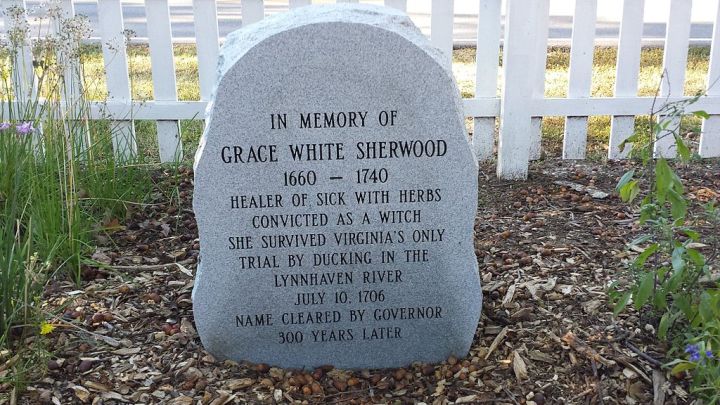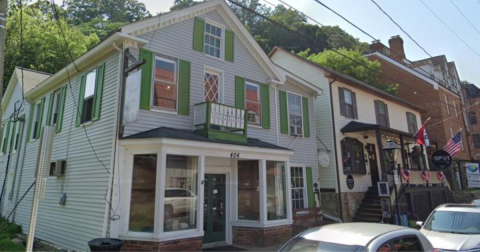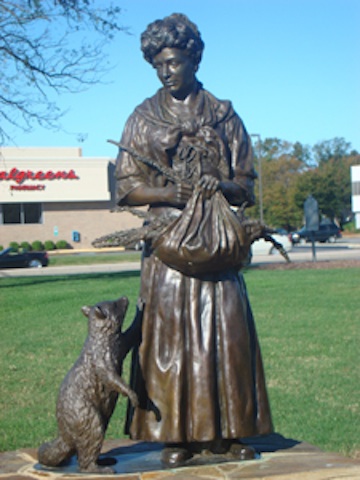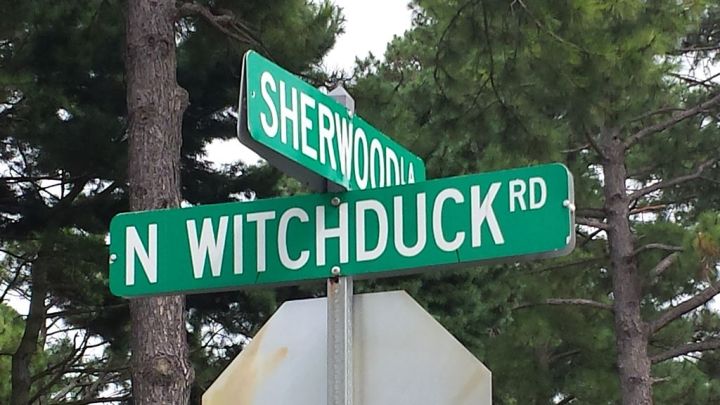These 14 Real Life Witches Show the 'Wicked' Side of Virginia's History
If you mention witchcraft and witch trials in America, you’re more than likely speaking of the infamous Salem Witch Trials – a period between February 1692 and May 1693 in which hundreds of people were accused of witchcraft and 20 were executed in Massachusetts. But, despite Massachusetts receiving much of the spotlight for Colonial witchcraft and subsequent trials, Virginia was actually the first of the colonies to see a formal accusation of witchcraft in 1626, as well as the first trial in 1641.
Historical records indicate that at least 15 people, 13 women and two men, were accused of witchcraft in Colonial Virginia. Most of the accused did not stand trial or were found “not guilty,” and many were able to countersue their accusers for defamation of character. Although many of the records have been lost over the years, we do know that only one person was executed and only one other found guilty.
Here’s a brief look at a few of the most notorious witches in the state…
1. 1626: Joan Wright
“Goodwife” Joan Wright, as she was known, was a midwife in Surry County and the first person in any of the colonies to be legally accused of witchcraft. Goodwife Wright was a healer and most likely a “cunning” woman, the term used for those who practiced low-level magic. This, combined with the fact that she was left-handed (a fact that made her untrustworthy by the superstitious standards of the day), served to make her an oddity in the community. Her accusers claimed that she had accurately predicted the deaths of at least four of her neighbors, bewitched livestock and crops and cast a spell that killed a newborn baby. Although she was arraigned, she never faced trial. No one knows what, if any, punishment she faced, but records indicate that at some point she was fined 100 pounds of tobacco for an unspecified act.
2. 1641: Mrs. George Barker

The first known witch trial in the New World took place in Norfolk in 1641. Mrs. George Barker was accused of witchcraft by Jane Rookens of “Lower” Norfolk, although the exact charges are not known. Mrs. Barker was acquitted of all charges and records indicate the Mrs. Rookens later said she “was sorry for what she said.” As compensation for the false accusation, Mrs. Rookens’ husband, George Rookens, was required to pay Mrs. Barker’s court charges and other related expenses.
3. 1654: Katherine Grady

While Katherine Grady is the only person to be executed for witchcraft in Virginia, she wasn’t actually in Virginia at the time of her death. Instead, she was on a ship headed for the new colony from England. At the time, it was not uncommon to blame sorcery or witchcraft for events like storms or drought. So, when a violent storm blew in, the witch hunt began. Katherine, an elderly woman, seemed the most likely candidate for sorcery and in an effort to stop the storm, she was hung at sea. As Virginia was the ship’s final destination, the event fell under the colony’s jurisdiction and the incident was reported by the captain upon his arrival in Jamestown.
4. 1656: William Harding
While the majority of those accused of witchcraft in Virginia, and the rest of the nation, were women, on occasion a man would come under suspicion for using dark magic or sorcery. In 1656, Reverend David Lindsay, a Scottish immigrant who had witnessed many witch trials in his home country, accused another Virginia man, William Harding, of witchcraft. Harding was found guilty of the charges, and sentenced to 13 lashes of the whip and ordered to leave the county.
5. 1698-1714: Grace Sherwood – The Witch of Pungo
As the most famous of Virginia’s witches, Grace Sherwood may or may not have doled out curses on her neighbors, but after what she went through, you would be hard pressed to blame her if she did. Born in Princess Anne County in the town of Pungo, Sherwood was non-traditional for a woman of her times. Said to be strikingly beautiful, she was also a healer, an herbalist and a midwife who wore men’s trousers when planting crops. The first case against her began in 1698 when Richard Capps began spreading rumors that she was a witch. Sherwood and her husband sued Capps for slander, but their case was dismissed.
Six months later, a local constable, John Gisburne, accused Sherwood of bewitching his pigs to death and destroying his cotton crops. At the same time, Elizabeth Barnes, another neighbor, accused Sherwood of coming to her in the night and “riding” her before escaping through “…the key hole or crack of the door like a Black Catt.” This time, when the Sherwoods sued for slander, the defendants won and the Sherwoods had to pay court costs.
Finally, in 1706, after several other run-ins with neighbors and the law, Sherwood was brought up on formal charges due to accusations by Luke and Elizabeth Hill. She was searched for strange markings that would confirm her status as a witch, but when none were found, the case went to a higher court.
In July 1706, she was ordered to a trial by water or “ducking.” When she was brought from her cell, the crowd chanted, “Duck the Witch!” And today, roads, lakes and neighborhoods where the trial took place bear the name “Witchduck.”

Sherwood survived the trial, thus “proving” she was a witch. She was imprisoned for 8 years before being released. She returned home and led a quiet life until her death in 1740 at the age of 80. Her story gained notoriety with the publication of a children’s book called “The Witch of Pungo” in 1973, and in 2006, she was exonerated by then Governor Tim Kaine on the 300th anniversary of her trial.
6. 1730: “Mary”
The last known case of witchcraft in Virginia occurred in 1730 when a woman known only as “Mary” was accused of using witchcraft to find lost items and treasure. While she never received a formal trial, she was sentenced to 39 lashes with the whip. Little else is known about her story, but it does serve as an example of the inconsistency and superstitious fear that seemed to drive witch trials in the 17th and 18th century.
While these 6 “witches” have the most documented stories, there are a number of other men and women that faced accusations of witchcraft in Virginia. This is what we know about them:
7. 1657: Barbara Wingbaugh. Although the charges are unknown, Barbara Winbaugh went to trial and was acquitted.
8. 1659: Mistress Robinson. Accused, but never tried, Mistress Robinson countersued and her accuser, Ann Godby, was fined 300 pounds in “Tobacco and Caske” as compensation for the slander.
9. 1671: Mrs. Christopher Neal. A resident of Northumberland County, Mrs. Neal was accused, but not tried.
10. 1675: Jane (or Joan) Jenkins. A resident of Norfolk, Jane Jenkins was also accused, but not tried.
11. 1678: Alice Cartwrite. Alice Cartwrite of Norfolk was acquitted during trial.
12. 1679: Paul Cartel. Not many records exist for this case, but apparently Mr. Cartel was accused of killing a man in Accomack County and the condition of the corpse was sufficient to find him guilty of using witchcraft to commit the murder.
13. 1694: Phyllis Money. Although acquitted, Phyllis Money of Westmoreland County had been accused of teaching her daughter and son-in-law how to be a witch and wizard and bewitching their horse. She countersued her accuser, William Earle, for damages, but received nothing.
14. 1695: Eleanor Morris. Accused of sorcery by a neighbor in King and Queen County, Eleanor Morris was acquitted, but her husband countersued the accuser for defamation. In the end, the Morrises walked away with 500 pounds.
While witch hysteria never reached the same proportions in Virginia as it did in Massachusetts and other parts of New England, witches were a fascinating part of our history all the same. And in terms of “firsts,” once again Virginia takes the prize…sorry, Salem!
Have you heard of any of these fascinating cases? We would love to hear what you know in the comments below!
OnlyInYourState may earn compensation through affiliate links in this article. As an Amazon Associate, we earn from qualifying purchases.










